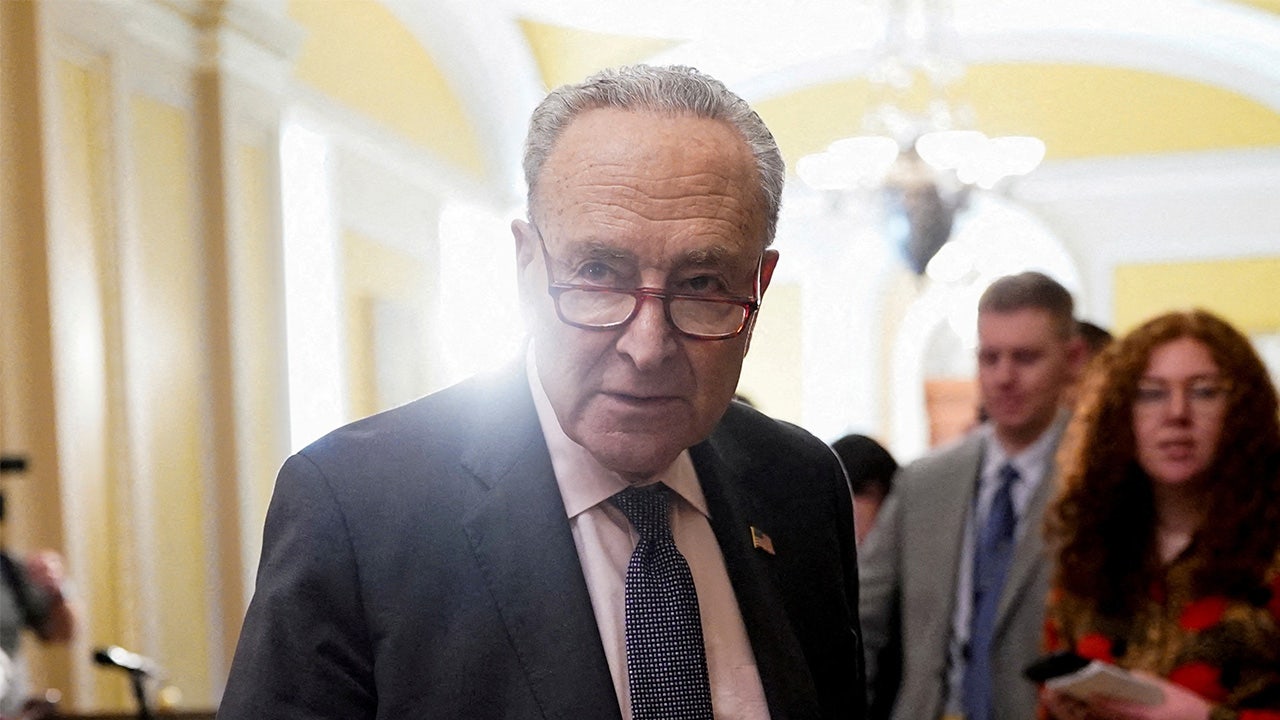World
Tunisia: Tourism dreams and violence woes after Djerba attack

Tunis, Tunisia – Tunisian academic Habib Kazdaghli was on a bus outside the Ghriba Synagogue when the attack happened earlier this month.
Neither he nor any of his students on the coach knew what was happening. “We thought it was a fight between the policemen at first,” he told a translator later. “We didn’t know how many people were involved. We just lay on the floor of the bus in silence, for over an hour and waited.”
A Muslim by birth, Kazdaghli has been travelling to the Ghriba Synagogue on the island of Djerba every year to join with the Jewish community in celebrating the festival of Lag Ba’omer.
“We just waited there, wondering if the gunman would come on the bus. I was hoping that none of the students would contact their parents or friends from the bus, because the gunman might hear. We just waited. We didn’t know anything.”
He paused, reflecting for a moment. “So much of this is about memory. All of us experience and repress memories. Something like this, especially for Tunisian Jews, just brings it all back,” he said.
Tunisia’s Jews have been present within the country for more than 2,000 years, mixing with Indigenous Berbers, Carthaginians, Romans and Arabs. From exile within Tunisia to persecution during the country’s Nazi occupation, few of these years have been free from incident.
Nevertheless, as the story of this latest attack spread through Tunisian media, the government’s determination to frame it as a criminal assault upon the tourism industry, rather than an anti-Semitic attack on one of the region’s most vulnerable communities, became increasingly apparent.
The facts as we know them are: Shortly after 8pm, National Guardsman Wissam Khazri, after having slain another officer and stolen his weapon and ammunition, arrived at the Synagogue, after having travelled more than half an hour overland by quad bike to reach it. Once there, the interior ministry said, he opened fire apparently indiscriminately, killing two pilgrims, cousins Avial and Ben Haddad, and two police officers, as well as wounding several more.
Two minutes later, he was shot dead by officers.
However, over the next 24 hours, the government pursued a course of minimising the anti-Semitic nature of the attack, while emphasising the minimal disruption caused to the country’s tourism industry, of which the island of Djerba contributes a significant amount.
The problem, Kazdagli said, was not that the government was unused to responding to crises, it was rather that they didn’t know how to respond to this crisis. “That the attack targeted Jewish people and that it took place at El Ghriba” left them paralysed, he said. “They don’t know how to explain it. They don’t know how to make it make sense to people,” he told a translator.
Addressing the country a day later, President Kais Saied characterised the attack as “criminal”, rather than “terrorist”, in nature, a term he deploys with relative ease against his opponents and critics. There was no mention of the gunman’s anti-Semitism or his specific targeting of the Jewish community. In a brief news conference a couple of days later, the interior minister informed journalists of the attacker’s name and that the ministry regarded the attack as premeditated. Little more was added.
The truth, according to observers such as Hamza Meddeb of the Carnegie Middle East Centre, is that, despite reports of four arrests since the shooting, the reality, including the race of those targeted, is simply too messy.
“I can understand why they don’t want to call this a terrorist incident,” he said. “It raises too many questions. Let’s not forget the attacker was a police officer, we know nothing of this guy’s background. Had he been radicalised? If so, by who? How extensive was his network? If they say he’s an anti-Semite, how extensive are those sentiments within the police? More significantly, how extensive are those sentiments across society? That’s an uncomfortable question.
“It’s much easier to simply dismiss the attack as a criminal act and move on,” he said.
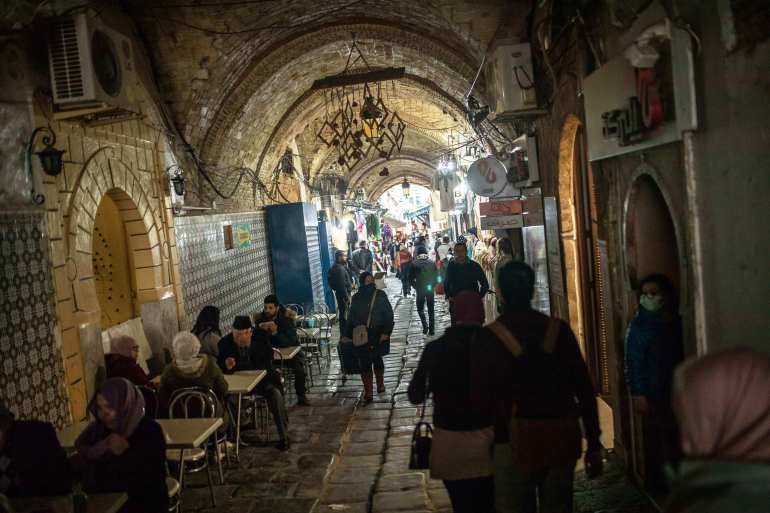
Currently, across Tunisia, the gaps in supermarket shelves are one of the best indicators of the variety of staple household goods the government subsidises. With every year that passes, the burdens upon the Tunisian economy grow heavier as the national currency, the dinar, shrinks further. Critically, healthy tourism revenues, and the hard currency they bring, might go some way to giving the president and his ministers room to manoeuvre in their negotiations over a potential bailout by the International Monetary Fund.
Against this grim backdrop, tourism, one of the few bright economic bright spots in Tunisia’s endless night, held out at least the seed of optimism. In a normal year, according to Tunisian economist, Raddhi Meddeb, tourism would contribute some 7 percent to Tunisia’s gross domestic product (GDP). Factoring in the ancillary industries, from farming to catering, that number doubles to 14 percent. Receipts so far, up 60 percent on the same period last year, already point to a promising summer.
“In terms of tourism, Tunisia generally competes in terms of price. Factor in the financial crisis taking place within Europe at the moment, as well as the instability in [competitor] Turkey and you’re looking at Tunisia becoming one of the key destinations for European tourists this summer,” Meddeb said.
However, all of this stands to be derailed by talk of a violent attack against a community considered so vulnerable that a large portion of the Tunisian security services is deployed every year to guard them.
“We know that for what we call, sun and sand tourists, safety is a significant feature,” Grzegorz Kapuscinski, a senior academic in tourism management at Oxford Brookes University, said.
“And it’s not really about just one attack, but the frequency of incidents and the collective awareness of them,” Kapuscinski said. “So yes, I can understand why the Tunisian government has chosen to handle it this way. With that said, I’m not sure it will work. I think full transparency is always the best idea.”
However, hoping that the world would simply forget about it and move on is looking less likely.
A further stumbling block for Tunisian efforts is an investigation launched in France with which Ben Haddad shared nationality, (Avial Haddad also carried an Israeli passport) which may not take as much heed of Tunisian sensitivities as President Saied might hope.
For now, however, the effect is more immediate. The families of the synagogue’s defenders, as well as those of Ben and Avial Haddad, all have to reconcile themselves with a savage and entirely unexpected loss. For them, at least, the summer can wait.

World
US Postal Chief DeJoy Stepping Down Immediately
World
UN blames Israelis for attack on compound but doesn't mention Hamas, says forced to reduce Gaza footprint
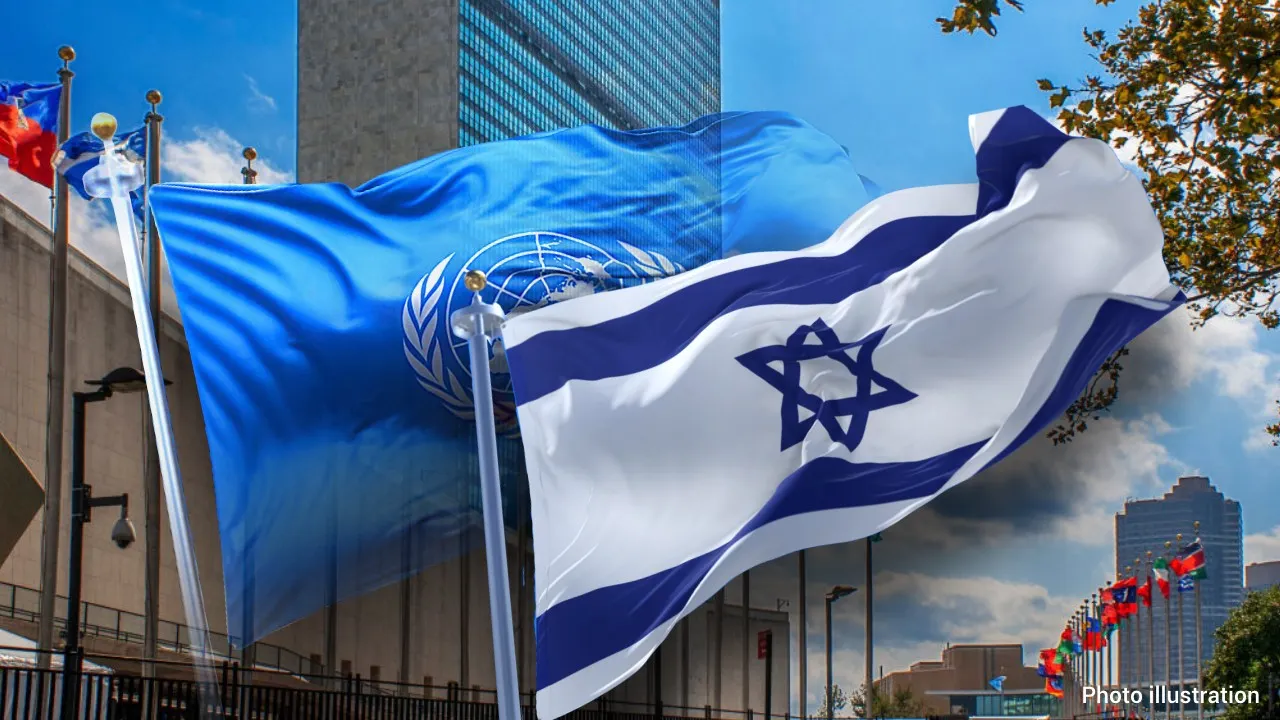
The United Nations is once again under the microscope for blaming Israel for an attack on a compound as it opts to curb its footprint in Gaza, according to the world body.
The spokesperson for United Nations Secretary-General António Guterres issued a statement noting the U.N. had “taken the difficult decision to reduce the Organization’s footprint in Gaza” even as “humanitarian needs soar.”
U.N. spokesman Stephane Dujarric claimed that “information currently available” indicated that a strike on the U.N.’s Deir al Balah compound on March 19 was “caused by an Israeli tank.” One U.N. employee was killed in the incident, and six others were wounded, Dujarric said.
DOGE USAID BUDGET HIT UN IN ‘WORST LIQUIDITY CRISIS SINCE ITS ESTABLISHMENT’
U.N. headquarters in New York City on Aug. 21, 2014. (iStock)
On the date of the incident, the Israel Defense Forces Tweeted that “contrary to reports, the IDF did not strike a U.N. compound in Deir el Balah.” The IDF asked media outlets “to act with caution regarding unverified reports.”
The IDF told Fox News Digital Monday that the U.N.’s claim was “absolutely not accurate.”
While his statement named Israel, it stopped short in naming the terrorist group Hamas or other extremist groups operating in Gaza. “The location of this U.N. compound was well known to the parties to the conflict,” Dujarric continued. “I reiterate that all parties to the conflict are bound by international law to protect the absolute inviolability of U.N. premises. Without this, our colleagues face intolerable risks as they work to save the lives of civilians.” Dujarric added that the “Secretary-General strongly condemns these strikes and demands a full, thorough and independent investigation on this incident.”
PAUSE IN US FOREIGN AID HAS UN IN PANIC OVER FUNDING CUTS, TRUMP SAYS WORLD BODY ‘NOT BEING WELL RUN’
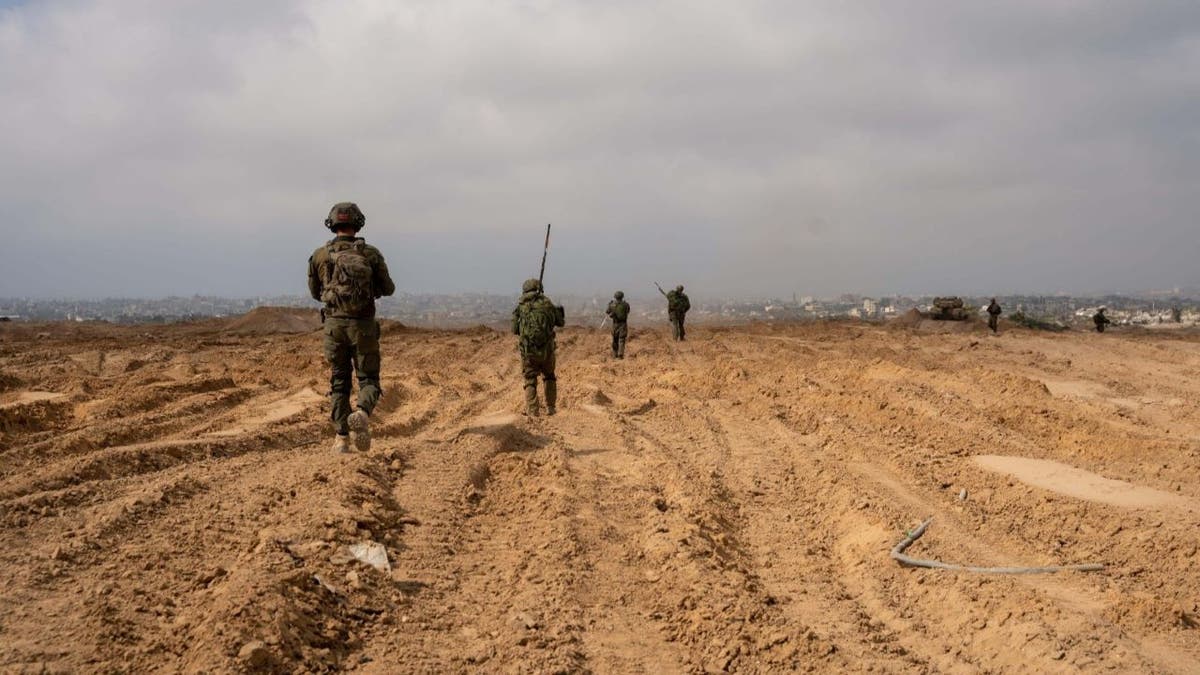
Israeli troops deployed to Gaza. (IDF)
Foundation for Defense of Democracies research analyst Joe Truzman told Fox News Digital that Dujarric’s statement gave the “impression… that the United Nations has deliberately avoided criticizing Hamas and the other Palestinian terrorist groups in Gaza for fear of creating friction with the armed groups. This failed strategy has only emboldened Hamas and its allies, allowing them to exploit UNRWA facilities in Gaza with impunity. Time and again, authorities have uncovered terrorist infrastructure connected to UNRWA facilities, including agency employees who were members of terrorist groups and committed atrocities on October 7.”
On March 23, the IDF killed Hamas political bureau member Ismail Barhoum while he was purportedly operating out of Nassar Hospital in Khan Younis, Gaza. After media outlets, including Al Jazeera, claimed that Barhoum was being treated at the hospital, IDF international spokesperson Lt. Col. Nadav Shoshani Tweeted that Barhoum had “held meetings with other terrorists and senior figures in the terrorist organization” while remaining “in the hospital for many weeks.”
AT LEAST 19 KILLED IN ISRAELI STRIKES IN GAZA, INCLUDING SENIOR HAMAS LEADER
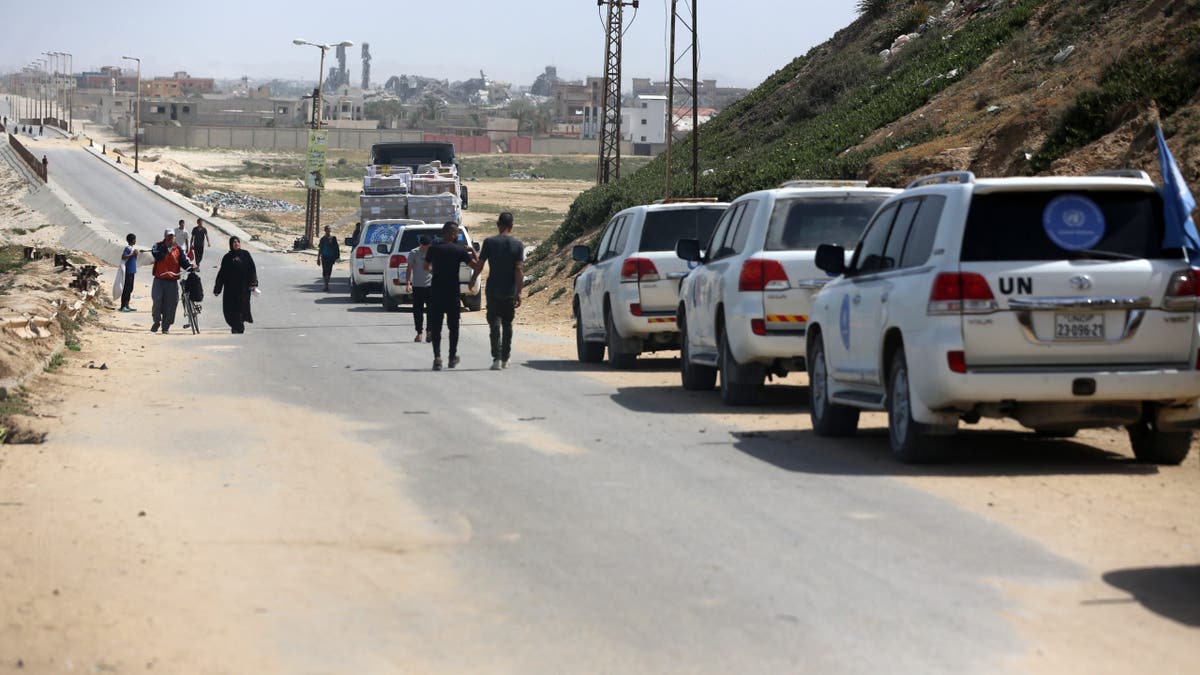
U.N. and the World Health Organization vehicles wait to enter the Gaza Strip with aid intended for hospitals on April 25, 2024. (Majdi Fathi/TPS)
Truzman said the IDF’s explanation was “highly plausible.”
“Hamas has become highly skilled at persuading the public that it does not operate from civilian infrastructure – a demonstrably false assertion,” Truzman said. In a tactic he has “witnessed for years,” he said that “Hamas and its allies deliberately embed themselves within civilian areas to evade detection.”
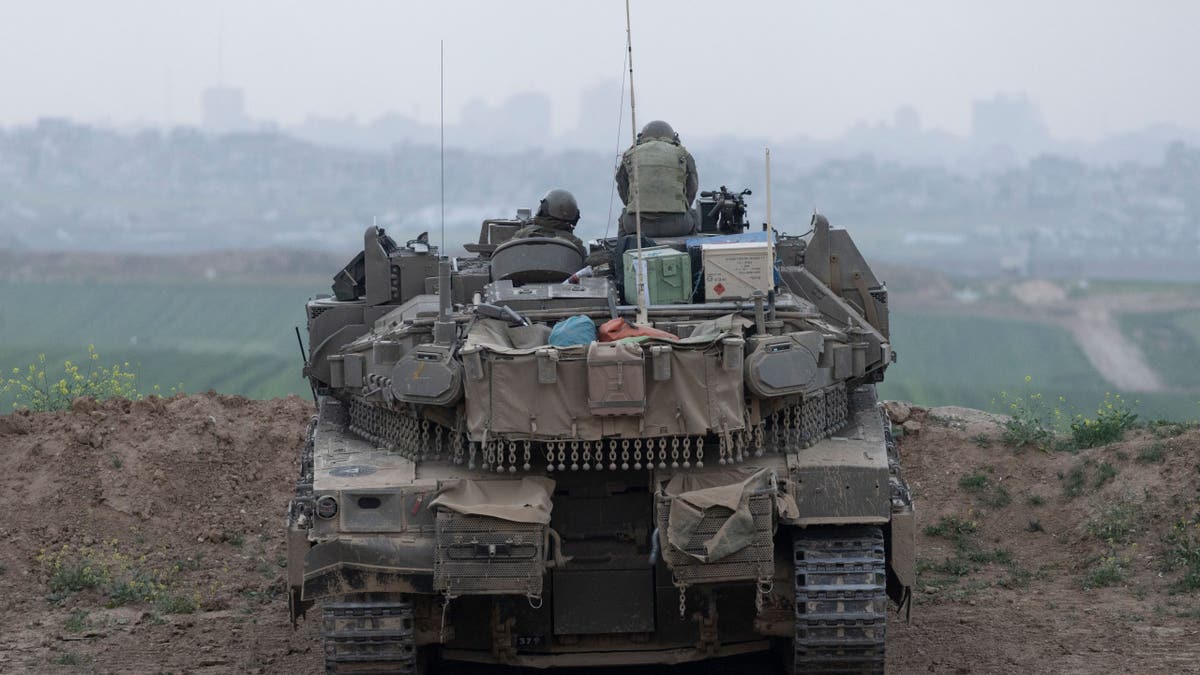
Israeli soldiers sit on a tank in the northern Gaza Strip on March 18, 2025. (Amir Levy/Getty Images)
“The public must understand that Hamas’ top priority is not safeguarding Palestinian civilians but ensuring the Islamist group’s survival,” Truzman said.
Following a ceasefire and partial hostage exchange that saw 25 living and eight deceased hostages returned to Israel and almost 2,000 Palestinian prisoners released, conflict has returned to Gaza. With support from the Trump White House, Israel cut humanitarian aid to Gaza earlier this month in order to pressure Hamas into an extension of the ceasefire, and to free the hostages.
World
At least five killed in RSF shelling in Sudan’s Khartoum: Lawyers’ group

The attack comes as the Sudanese army pushes to take full control of the capital.
Paramilitary shelling on a mosque in eastern Khartoum has killed at least five people and injured dozens, a Sudanese pro-democracy lawyers’ group has said.
The attack on Monday, which has been blamed on the paramilitary Rapid Support Forces (RSF), targeted civilians during evening tarawih prayers at a mosque in the East Nile district of Khartoum, said the Emergency Lawyers network, which has been documenting abuses by both the RSF and the Sudanese Armed Forces (SAF).
This is the second reported attack on civilians since the RSF lost central Khartoum, including the presidential palace, in a major government army offensive on Friday.
On Sunday, RSF artillery also pounded Omdurman, Khartoum’s twin city, killing three civilians in what eyewitnesses described as some of the heaviest bombardments in recent months.
The Sudanese army claims to have seized control of the main headquarters of the country’s central bank from the RSF as it continues to make advances in the capital.
Nabil Abdallah, an army spokesman, said in a statement to the AFP news agency on Saturday that the soldiers had “eliminated hundreds of militia members who tried to escape through pockets in central Khartoum”.
The RSF has consolidated control in the west, hardening battle lines and moving Sudan towards de facto partition. The RSF is setting up a parallel government in areas it controls, although that is not expected to secure widespread international recognition.
Since April 2023, the military, led by army chief Abdel Fattah al-Burhan, has been in an ongoing conflict with the RSF, headed by Burhan’s former deputy commander, Mohamed Hamdan Dagalo.
But the two-year-long conflict has left the country in a deep humanitarian crisis, with tens of thousands of people killed and more than 12 million people displaced.
-
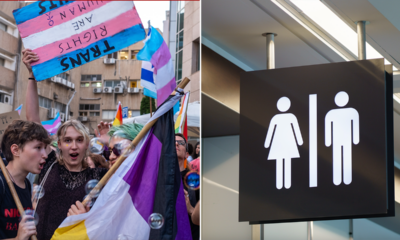
 Midwest1 week ago
Midwest1 week agoOhio college 'illegally forcing students' to share bathrooms with opposite sex: watchdog
-

 News1 week ago
News1 week agoFor Canadians Visiting Myrtle Beach, Trump Policies Make the Vibe Chillier
-

 News6 days ago
News6 days agoTrump Administration Ends Tracking of Kidnapped Ukrainian Children in Russia
-

 News6 days ago
News6 days agoVance to Lead G.O.P. Fund-Raising, an Apparent First for a Vice President
-

 News1 week ago
News1 week agoArlington National Cemetery stops highlighting some historical figures on its website
-

 News1 week ago
News1 week agoBlack Lives Matter Plaza Is Gone. Its Erasure Feels Symbolic.
-

 Movie Reviews1 week ago
Movie Reviews1 week agoPerusu Movie Review: Mourning wood provides comedy that won’t go down in history
-

 Politics1 week ago
Politics1 week agoHouse Democrats to hold 'Day of Action' to push back against GOP-backed spending bill















